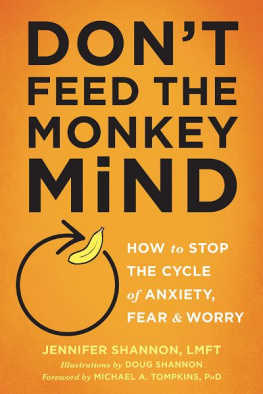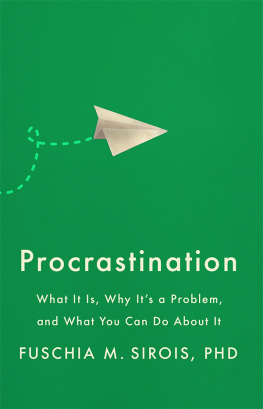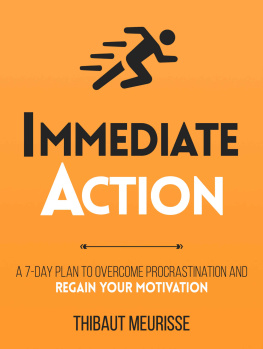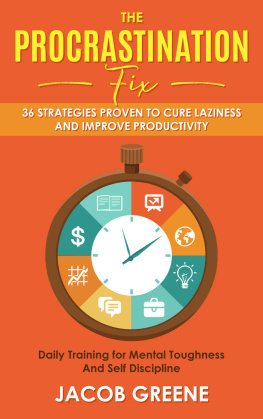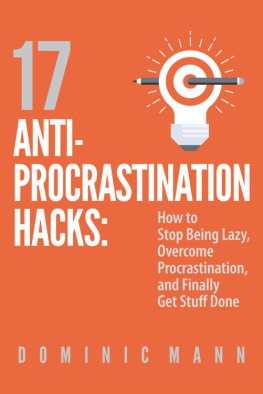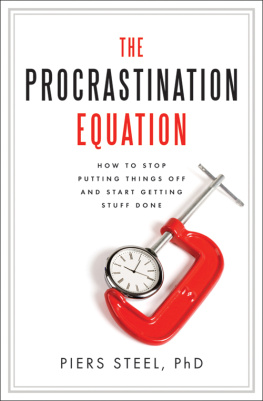

If you tend to put things off, A Teens Guide to Getting Stuff Done will help you to understand the reasons for your procrastination and (more importantly) what you can do about it. Its filled with commonsense, step-by-step tools that will help you to break the cycle of stalling and start getting things done. So, dont delaycheck out this book now!
Martin M. Antony, PhD, ABPP, professor of psychology at Ryerson University in Toronto, ON, Canada, and coauthor of The Shyness and Social Anxiety Workbook
Its not often you hear about procrastination without judgment or shame. Jennifer Shannon takes a compassionate approach to the complexities of why people procrastinate, and what can be done about it. Although this guide is for teens, I suggest anyone who suffers from the disappointment that can come with not completing a task read this, as well. As a temperament specialist, I appreciate the invitation for teens to understand their procrastination style and type, such as the perfectionist, the warrior, the pleaser, and the rebel. This book is right on target, and is bound to lead to less stress and more success!
Rona Renner, RN, parenting coach and author of Is That Me Yelling?
The Shannons have done it again! Like their other books, A Teens Guide to Getting Stuff Done is engaging, easy to understand, and graphically entertaining. Teens and older readers alike will enjoy figuring out their procrastination type and discovering skills to conquer it. Reading this book is one step procrastinators will find both doable and rewarding. Enjoy the ride!
Christine A. Padesky, PhD, coauthor of Mind Over Mood
Jennifer Shannons newest book is an outstanding resource for getting out of your own way when it comes to procrastination. I will be gifting every one of my parenting friends a copy of A Teens Guide to Getting Stuff Done. Thank you, Jennifer, for another great resource!
Sharon L. Bowman, MA, author of Training from the BACK of the Room! and Using Brain Science to Make Training Stick
A Teens Guide to Getting Stuff Done is incredibly readable, and most of alluseful! Shannon clearly knows her audience and the daily challenges that are in our way. Her examples are vividly real, and her solutions are all about ultimate freedom from our inner obstacles.
Ellie Dwight, assistant head of school at Sonoma Academy in Santa Rosa, CA
Publishers Note
This publication is designed to provide accurate and authoritative information in regard to the subject matter covered. It is sold with the understanding that the publisher is not engaged in rendering psychological, financial, legal, or other professional services. If expert assistance or counseling is needed, the services of a competent professional should be sought.
Distributed in Canada by Raincoast Books
Copyright 2017 by Jennifer ShannonInstant Help BooksAn Imprint of New Harbinger Publications, Inc.5674 Shattuck AvenueOakland, CA 94609www.newharbinger.com
Illustrations by Doug Shannon; Cover design by Amy Shoup; Acquired by Tesilya Hanauer; Edited by Karen Schader
All Rights Reserved
Library of Congress Cataloging-in-Publication Data on file
Contents
Procrastination: Problem or Solution?
If you consider yourself a procrastinator, youre in good company. Whether its making a difficult phone call or decision, doing homework or working out, getting out of bed in the morning or into bed at night, we all put things off at times. And thats not always a bad thing.
Leaving a difficult task to the last minute can create a sense of urgency that helps you focus on it. When you ignore a problem, it may take care of itself, and sometimes the thing you didnt get done is something you didnt truly want to do in the first place. But as many of us have experienced, when we regularly postpone tasks and obligations that we want or need to do, we pay a price.
The price is usually paid in self-esteem. Chronic procrastinators dont feel happy and proud about it. If youre a procrastinator, you have likely been told that you are lazy, disorganized, unmotivated, maybe even stupid. People who dont have this problem can be very judgmental. It can feel like they are being mean, but they are most likely worried about you. They want you to succeed, and they can see how procrastination could be getting in the way of your success. They too may have problems with procrastination and share the burden of shame. They dont want you to suffer as they have. But their comments, no matter how well intentioned, usually make matters worse.
When we hear negative judgments about ourselves often enough, we tend to internalize them. You may be beating yourself up for your lack of motivation or organization, or your inability to get things done. You ask yourself, Why do I put off tasks I know I have to do, and sometimes even want to do? Why cant I make myself do whats necessary to get where I want to go? Unable to answer these questions, you can easily get discouraged. Without compassion for yourself, procrastination is hard to live with.
The price we pay for procrastination is usually diminished self-esteem.
From my experience working with both teens and adults, I can say with authority that putting things off doesnt mean you are bad, lazy, stupid, or in any other way inferior. Procrastination is not a sign of weakness or moral failing. Its simply a human problem. And the challenge is bigger for you than it was for your parents. Our smartphones and computers are increasingly powerful agents of distraction that make staying focused on tasks more difficult every day. Wherever you are, distraction is only a click away. Social media, email, and text messages beckon night and day. If you dont respond immediately, you might hurt someones feelings or miss out on something cool. No previous generation had to deal with the powerful distractions of the digital age.
Much of the help and advice given to procrastinators is about how you can organize yourself to meet deadlines, with lots of rules to follow. Time management is indeed important; I have a whole chapter devoted to it later in the book. However, to solve your procrastination problem at the core, its more important to understand the person who is managing that timeyou.
Procrastination is not a sign of weakness or moral failing.
Your sensibility, your temperament, your values and motivations do not fit neatly into a one-size-fits-all definition of the procrastinator. Neither you nor the problem of procrastination is that simple. To better identify how procrastination works with you, I have divided those of us with a tendency to put things off into four types, each with its own values, weaknesses, and strengths, as well as reasons for procrastinating.
Are you the perfectionist, who has to get things right; the warrior, who must feel fully engaged; the pleaser, who must keep everyone happy; or the rebel, who resists doing what others ask or assign? Dont be too quick to answer. Theres a little of each type in all of us.
Whether you are one pure type or a hybrid of two or more, youll want to know more about them all. In the next few chapters well explore the worlds of the perfectionist, the warrior, the pleaser, and the rebel, discovering the unique vulnerability of each to procrastination, as well as the hidden superpower each can tap into to master challenging tasks.
Next page

